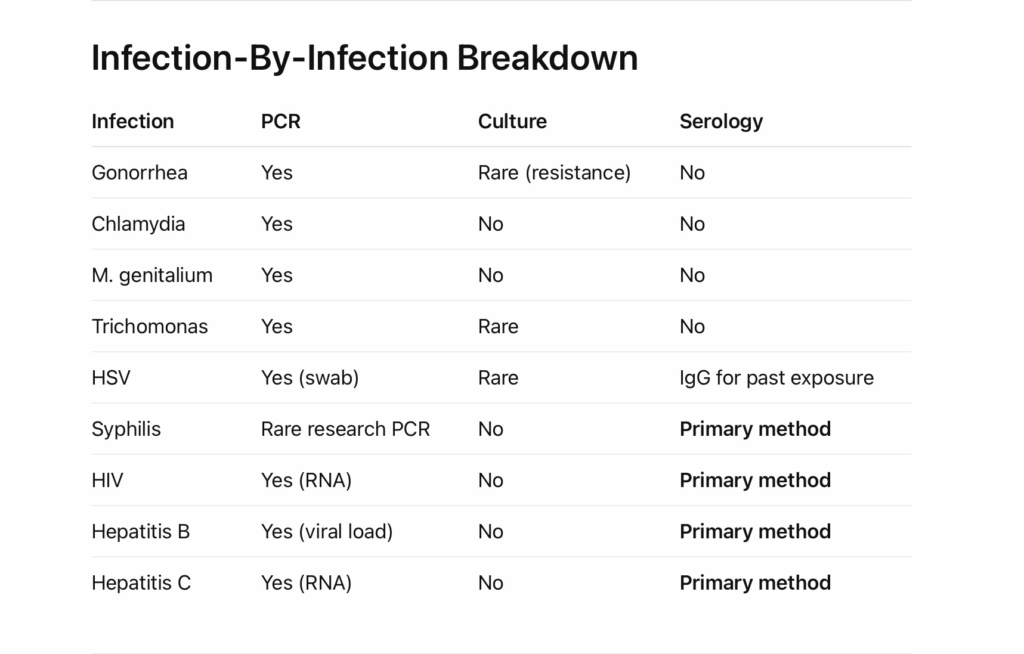Laboratory Testing 101

PCR, Culture, and Serology — What They Are, How They Work, and Which STIs Use Which Test
Most people have no idea how laboratories actually diagnose infections. They imagine swabs going onto petri dishes or believe that all tests work the same way. In reality, there are three completely different testing methods used in modern sexual health:
- PCR (and other NAAT methods) – detects genetic material
- Culture – grows a live organism
- Serology – detects antibodies your immune system makes
These methods are not interchangeable. Each infection requires the method that actually works for that organism.
Below is the clear, plain-English explanation that finally makes sense.
⸻
PCR / NAAT
Detecting the genetic code of an infection:
PCR (polymerase chain reaction) looks for tiny fragments of DNA or RNA belonging to the infection.
How PCR works:
- Your sample goes into a molecular analyzer.
- The machine searches for the pathogen’s genetic “signature.”
- If any is found, the machine copies it millions of times (amplification).
- This amplified signal is detected and reported as Detected or Not Detected.
PCR does not require the organism to be alive.
A single fragment of genetic material is enough.
That makes PCR:
- extremely sensitive
- extremely accurate
- extremely fast
- ideal for bacteria and viruses that die quickly outside the body
Infections detected by PCR:
- Gonorrhea
- Chlamydia
- Mycoplasma genitalium
- Trichomonas
- HSV (from sores)
- HIV RNA
- Hepatitis B DNA
- Hepatitis C RNA
⸻
Culture
Growing the organism in a lab:
Culture relies on keeping the organism alive.
How culture works:
- The sample is placed in a transport medium.
- The organism must survive long enough to be plated.
- The lab attempts to grow it.
- If it grows, the organism is identified.
The problem with culture:
Most STI pathogens:
- die quickly
- do not survive transport
- do not grow reliably
- or cannot be cultured at all
Culture is now mostly obsolete in STI medicine.
Where culture still matters:
- Gonorrhea antibiotic resistance testing
- Rare HSV confirmations if PCR unavailable
- Some research labs
⸻
Serology
Detecting antibodies, not the organism:
Serology is a blood test that looks for antibodies your body makes in response to an infection.
How serology works:
- Your blood is tested for specific antibodies.
- If they bind to the test antigen, a signal appears.
- The result is interpreted as Detected or Not Detected.
Serology is not direct detection of the infection itself.
It detects your immune response.
Infections diagnosed by serology:
- Syphilis (treponemal + RPR titer)
- HIV (antigen–antibody tests)
- Hepatitis B (HBsAg, HBsAb, HBcAb)
- Hepatitis C (antibody + confirmatory PCR)
- HSV IgG (past exposure only — not useful for diagnosing sores)
⸻
Infection-By-Infection Breakdown

⸻
Why Different Infections Require Different Tests
Every pathogen behaves differently.
Some survive transport. Some die instantly.
Some trigger strong antibodies. Others barely trigger any.
Some are easy to detect in urine. Others only show up in blood.
There is no “one universal STI test.”
Accuracy comes from using the correct method for each organism, not shortcuts.
⸻
The Bottom Line
- PCR detects infections directly
- Culture is rarely used today
- Serology detects your immune response
- Syphilis, HIV, and hepatitis require blood testing
- Gonorrhea, chlamydia, trich, and Mgen require PCR
- HSV sores require PCR, not blood tests
- Using the wrong test leads to inaccurate answers
This is why Shameless Care uses:
- PCR for site-specific STI testing
- Serology for syphilis, HIV, and hepatitis
- No outdated culture-based STI screening
Accurate sexual-health testing requires accurate methods, not fear, shortcuts, or marketing gimmicks.
⸻
A Better Way to Approach STI Testing
If you want testing that actually reflects how infections are diagnosed in modern medicine, choose a service built on real laboratory science, not “at-home gadget” testing.
At Shameless Care, we use:
- multi-site PCR panels
- high-complexity CLIA-certified labs
- physician oversight
- accurate serologic testing where appropriate
- no upsells, no fear tactics, and no outdated culture methods
Explore Shameless Care STI Testing
Testing when you are ready — not when you are anxious — is the foundation of healthy, confident sexual care.
Get valuable knowledge like this, straight to your inbox once a week.
No spam, no sales pitches. Just knowledge. Unsubscribe any time, and we’ll never sell your information.
